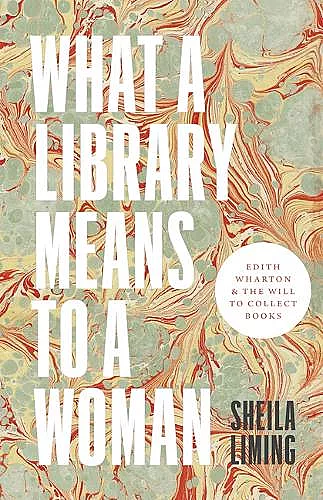What a Library Means to a Woman
Edith Wharton and the Will to Collect Books
Format:Paperback
Publisher:University of Minnesota Press
Published:28th Apr '20
Should be back in stock very soon

Examining the personal library and the making of self
When writer Edith Wharton died in 1937, without any children, her library of more than five thousand volumes was divided and subsequently sold. Decades later, it was reassembled and returned to The Mount, her historic Massachusetts estate. What a Library Means to a Woman examines personal libraries as technologies of self-creation in modern America, focusing on Wharton and her remarkable collection of books.
Sheila Liming explores the connection between libraries and self-making in late nineteenth- and early twentieth-century American culture, from the 1860s to the 1930s. She tells the story of Wharton’s library in concert with Wharton scholarship and treatises from this era concerning the wider fields of book history, material and print culture, and the histories (and pathologies) of collecting. Liming’s study blends literary and historical analysis while engaging with modern discussions about gender, inheritance, and hoarding. It offers a review of the many meanings of a library collection, while reading one specific collection in light of its owner’s literary celebrity.
What a Library Means to a Woman was born from Liming’s ongoing work digitizing the Wharton library collection. It ultimately argues for a multifaceted understanding of authorship by linking Wharton’s literary persona to her library, which was, as she saw it, the site of her self-making.
"A generous reassessment of Edith Wharton and materialized cultures. With this exceptional interpretation of the modern bookshelf, Sheila Liming offers page after page of unanticipated insight into gender and literary production. This is mandatory reading for those of us committed, like Wharton, to harboring ‘an ethos of collecting’—and for those of us, like this brave critic, committed to Wharton herself."—Scott Herring, Indiana University
"This imaginative, deeply learned study illuminates the role of libraries and books for Edith Wharton, but it also provides an important examination of what the art of collecting books in the late nineteenth century tells us about how women writers and readers created networks of intellectual labor and ambition. Lyrically written and brilliantly argued, Sheila Liming’s study is also an indispensable meditation on the act of collecting and the unseen worlds ordinary and extraordinary readers and writers created through it."—Stephanie Foote, author of The Parvenu’s Plot: Gender, Culture, and Class in the Age of Realism
"It makes sense that Liming would posit the meaning of libraries in general in a book about what a library means to a woman: the universalization of intellectual inheritance passes by necessity through women. Sheila Liming’s fascinating book proves her to be an exemplary heir."—Los Angeles Review of Books
"An enormously valuable addition to our understanding of one of the twentieth century’s most literary bibliophiles."—ALH Online Review
ISBN: 9781517907044
Dimensions: 216mm x 140mm x 38mm
Weight: unknown
272 pages